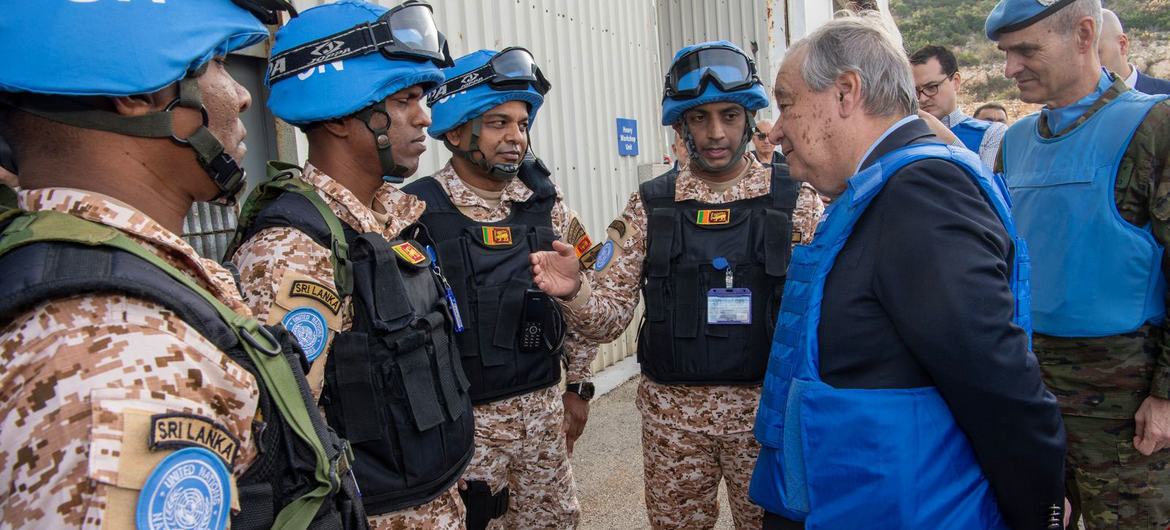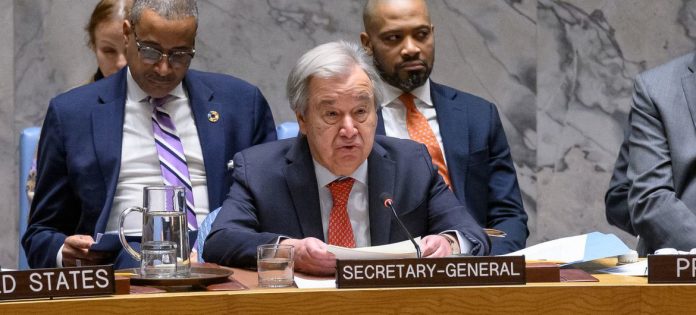António Guterres spoke at the Council’s initial quarterly debate on the Middle East for the year, which took place in the context of a temporary ceasefire in Gaza on Sunday, the cessation of hostilities in Lebanon arising from the war, and the collapse of the Assad regime in Syria.
“We have a responsibility to ensure that the people of the Middle East emerge from this tumultuous period with peace, dignity, and a hopeful future grounded in action,” he stated, following a recent visit to Lebanon.
‘Ray of hope’
Mr. Guterres mentioned that the ceasefire in Gaza and the hostage release deal signify “a glimmer of hope.”
The initial phase of the arrangement was put into effect on Sunday, with Hamas releasing three female hostages and Israel releasing 90 Palestinian detainees.
“Although there are many challenges ahead, we should acknowledge the relief this moment brings to Palestinians in Gaza and the hostages reunited with their families,” he remarked.
Simultaneously, the UN is contributing to expedite the delivery of humanitarian aid. More than 630 aid trucks entered Gaza on Sunday, with at least 300 heading to the northern region.
Fully implement the deal
He stressed that the parties must now uphold their commitments and completely execute the agreement to ensure the release of all hostages and a lasting ceasefire in Gaza.
The Secretary-General vowed that the UN will “make every effort to further these initiatives – particularly to enhance the delivery of humanitarian aid throughout Gaza, fully understanding the substantial obstacles, challenges, and limitations that still exist.”
Action on the ground
The ceasefire “must result in at least four simultaneous actions on the ground,” he mentioned.
Firstly, UN entities – including UN Palestine refugee agency, UNRWA, described as “the backbone of our humanitarian response” – should be able to fulfill their duties without hindrance.
“The UN should have swift, secure, and unhindered access through all potential avenues and crossings to supply food, water, medicine, fuel, shelter, and infrastructure repair materials across Gaza, including the northern area,” he stated.
Other humanitarian groups, including local and international non-governmental organizations (NGOs) and the private sector, should also have unobstructed safe passage.
Safe operating environment
His second point emphasized that increasing the delivery of aid and essential services requires safe conditions and a suitable working environment. Humanitarians also need the necessary technical, protective, and communication equipment.
“To carry out our work, the parties must collaborate with the UN system in a prompt and effective manner. This also involves restoring public order and safety to prevent the looting of humanitarian supplies,” he explained.
© UNRWA
A man carries food aid distributed by the UN in Gaza.
Aid access, civilian protection
Mr. Guterres emphasized that people must have access to life-saving aid, as his third point. This includes medical evacuations for those in need, and he called on countries to admit these patients.
Adequate commercial supplies should also be allowed to enter Gaza to meet the significant needs of the population, he added.
His final point highlighted the need to protect civilians, and for those wishing to return to their communities to have safe passage.
“Explosive devices must be cleared. The recovery of human remains must be conducted with respect and dignity,” he stressed.
‘Seize the opportunity’
The Secretary-General urged the Security Council and all UN Member States to back all efforts to implement the ceasefire, achieve a permanent end to hostilities, ensure accountability, and establish conditions for recovery and reconstruction.
Furthermore, the international media “should also be allowed into Gaza to report on this vital situation on the ground.”
Mr. Guterres called on the international community to “seize the opportunity” presented by the ceasefire agreement to intensify actions toward enhancing governance and security frameworks in Gaza.
He noted that the Palestinian Authority has expressed readiness to assume its duties and responsibilities in the area
“I urge collective support for establishing security and governance mechanisms that will enable Gaza to be politically, economically, socially, and administratively reunified with the West Bank,” he said.
Two-State solution requires ‘irreversible action’
He expressed regret that the situation in the West Bank continues to deteriorate, with clashes, airstrikes, and relentless illegal settlement expansion and demolitions.
“I am deeply worried about a serious threat to the integrity and continuity of the Occupied Palestinian Territory of Gaza and the West Bank,” Mr. Guterres stated.
He pointed out that senior Israeli officials openly mention the formal annexation of all or part of the West Bank in the coming months, a move that would constitute a grave violation of international law.
He said “it is evident that achieving greater stability in the Middle East demands irreversible steps towards a two-State solution” between Israelis and Palestinians.

UNIFIL/Pasqual Gorriz
UN Secretary-General António Guterres (right) meets UN peacekeepers from Sri Lanka in Naqoura in southern Lebanon.
‘New dawn’ in Lebanon
Regarding Lebanon, the Secretary-General noted that “a new dawn is emerging” in the nation, “with an imminent government where all Lebanese citizens will hopefully feel represented, and a State capable of ensuring security for all its residents.”
During his recent trip, Mr. Guterres visited the south, where he witnessed firsthand “the severe human impact and devastation” caused by 13 months of conflicts between Hamas militants and Israeli troops.
The governments of Lebanon and Israel signed a ceasefire agreement last November, which, he mentioned, remains fragile but still holding.
“It is essential that the Israeli presence in the south concludes as stipulated in the agreement, and that the Lebanese Armed Forces are stationed throughout Lebanon,” he said
‘Flame of hope’ in Syria
Mr. Guterres also discussed the situation in Syria.
“After the downfall of the previous oppressive regime and years of bloodshed, there is a glimmer of hope for the people of Syria,” he commented. “We must not allow this spark of hope to turn into a blaze of chaos.”
He emphasized the UN’s commitment to collaborating with Syrians and the international community to support a Syrian-led process towards a credible and inclusive political transition.
“As Syria embarks on a new path and aspires to reconstruct its institutions and political systems, we will facilitate an inclusive process that fully respects the rights of all and sets the stage for a united and sovereign Syria with its territorial integrity fully restored,” he said.
Gaza: Return to a semblance of normality
Following the ceasefire and hostage release agreement that came into effect on Sunday, thousands of individuals in war-ravaged Gaza have started to return to what remains of their residences as life gradually begins to return to a semblance of normalcy.
“People are outside, children are playing, and the sounds of explosions and drones have ceased,” stated Sam Rose, Senior Deputy Director of UNRWA Affairs in Gaza, in an interview with UN News‘s correspondent in the enclave.
Listen to his insights on the humanitarian response post-ceasefire, below.




